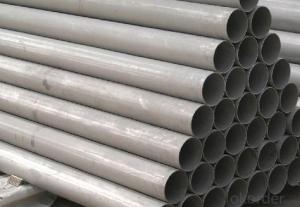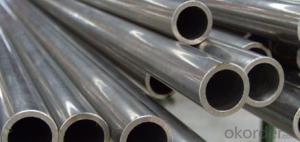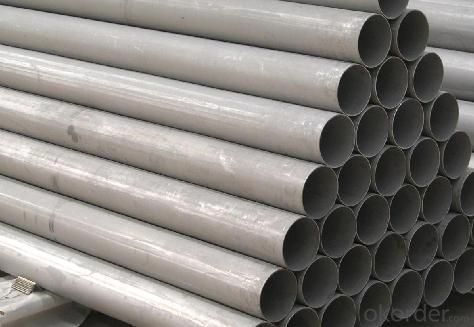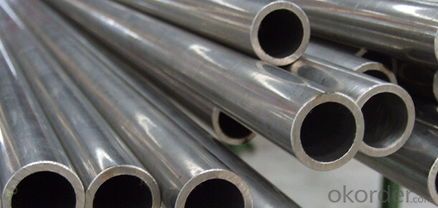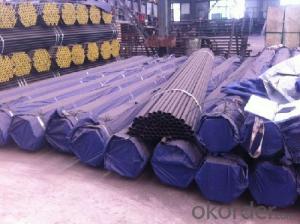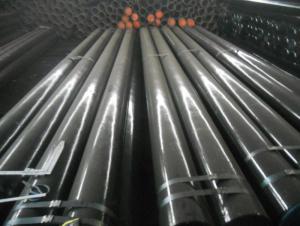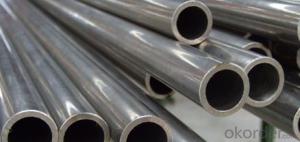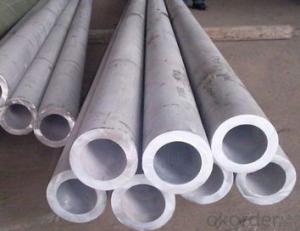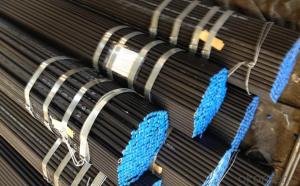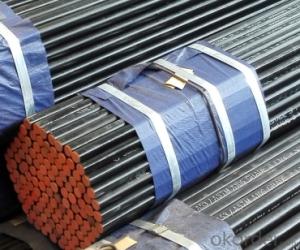Carbon Steel Seamless Pipe for Line Pipe PSAL 1 for Structure
- Loading Port:
- Tianjin
- Payment Terms:
- TT OR LC
- Min Order Qty:
- 25 m.t.
- Supply Capability:
- 10000 m.t./month
OKorder Service Pledge
OKorder Financial Service
You Might Also Like
Product Description:
1、Carbon Steel Seamless Pipe for Line Pipe PSAL 1 for Structure Description:
Seamless steel pipe is formed by drawing a solid billet over a piercing rod to create the hollow shell. As the manufacturing process does not include any welding, seamless pipes are perceived to be stronger and more reliable. Historically seamless pipe was regarded as withstanding pressure better than other types, and was often more easily available than welded pipe.
2、Main Features of Carbon Steel Seamless Pipe for Line Pipe PSAL 1 for Structure:
• High manufacturing accuracy
• High strength
• Small inertia resistance
• Strong heat dissipation ability
• Good visual effect
• Reasonable price
3、Carbon Steel Seamless Pipe for Line Pipe PSAL 1 for Structure Images:
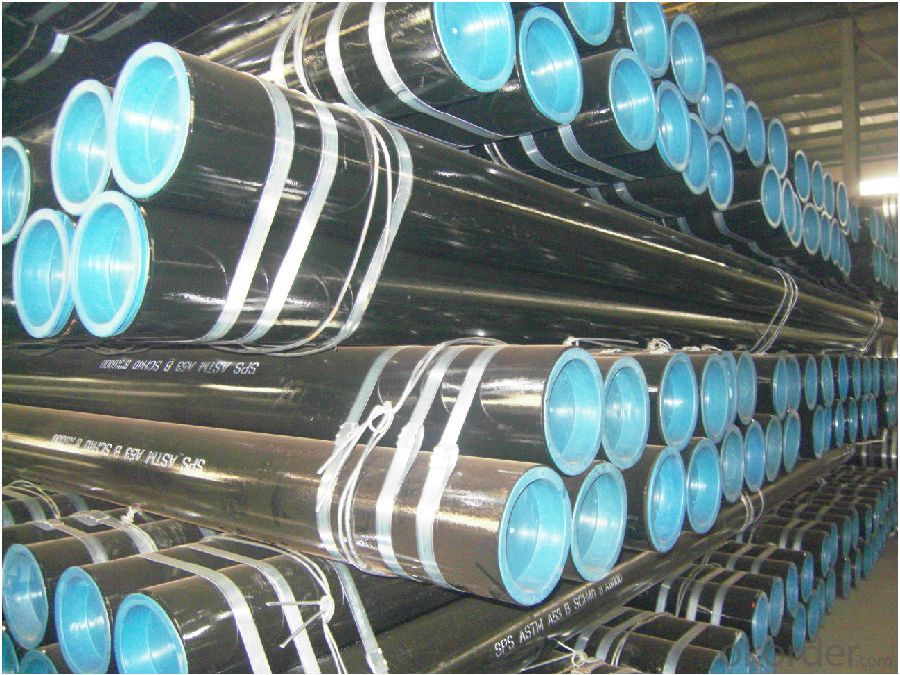
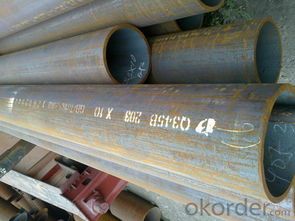
Packaging & Delivery
Packaging Details: | seaworthy package,bundles wrapped with strong steel strip |
Delivery Detail: | 15-30days after received 30%TT |
4、Carbon Steel Seamless Pipe for Line Pipe PSAL 1 for Structure Specification:
Standard | GB, DIN, ASTM |
Grade | 10#-45#, 16Mn |
Thickness | 8 - 33 mm |
Section Shape | Round |
Outer Diameter | 133 - 219 mm |
Place of Origin | Shandong, China (Mainland) |
Secondary Or Not | Non-secondary |
Application | Hydraulic Pipe |
Technique | Cold Drawn |
Certification | API |
Surface Treatment | factory state or painted black |
Special Pipe | API Pipe |
Alloy Or Not | Non-alloy |
Length | 5-12M |
Outer Diameter | 21.3-610mm |
Grade | 20#, 45#, Q345, API J55, API K55, API L80, API N80, API P110, A53B |
Standard | ASME, ASTM |
1.Material:20#(ASTM A 106/A53 GRB.API5LGRB,GB),45#,16Mn,10#.
2.Specification range:OD:21.3-610mm,WT:6-70mm,length:6-12m or according to the requirement of clients.
3.Excutive standards:GB,ASME API5L.ASTM A 106/A53,Despite of the above standards,we can also supply seamless steel pipe with standard of DIN,JIS,and so on,and also develop new products according to the requirements of our clients!
4.Surface:black lacquered,varnish coating or galvanized.
5.Ends:Beveled or square cut,plastic capped,painted.
6.Packing:bundles wrapped with strong steel strip,seaworthy packing.
5、FAQ of Carbon Steel Seamless Pipe for Line Pipe PSAL 1 for Structure :
①How is the quality of your products?
Our products are manufactured strictly according to national and internaional standard, and we take a test
on every pipe before delivered out. If you want see our quality certifications and all kinds of testing report, please just ask us for it.
Guaranteed: If products’ quality don’t accord to discription as we give or the promise before you place order, we promise 100% refund.
②How about price?
Yes, we are factory and be able to give you lowest price below market one, and we have a policy that “ for saving time and absolutely honest business attitude, we quote as lowest as possible for any customer, and discount can be given according to quantity”,if you like bargain and factory price is not low enough as you think, just don’t waste your time.Please trust the quotation we would give you, it is professional one.
③Why should you chose us?
Chose happens because of quality, then price, We can give you both.Additionally, we can also offer professional products inquiry, products knowledge train(for agents), smooth goods delivery, exellent customer solution proposals.Our service formula: good quality+good price+good service=customer’s trust
SGS test is available, customer inspection before shipping is welcome, third party inspection is no problem.
Any question, pls feel free to contact us !
- Q: How are steel pipes used in the construction of gas distribution networks?
- Steel pipes are commonly used in the construction of gas distribution networks due to their durability, strength, and ability to withstand high pressure. These pipes are used to transport natural gas from the source to homes, businesses, and industries. The steel pipes are laid underground and connected using fittings and valves to create a network that efficiently distributes gas. It ensures a safe and reliable delivery of gas to consumers while minimizing the risk of leaks or accidents.
- Q: Are steel pipes fire-resistant?
- Yes, steel pipes are fire-resistant. Steel is a non-combustible material, which means it does not burn or contribute to the spread of fire. Steel pipes have high melting points and can withstand extreme temperatures, making them highly resistant to fire. They are commonly used in various applications where fire protection is crucial, such as fire sprinkler systems, fire hydrant systems, and fire-resistant building structures. Additionally, steel pipes are also known for their durability and strength, which further enhances their fire resistance capabilities.
- Q: Can steel pipes be used for conveying food and beverages?
- No, steel pipes are not suitable for conveying food and beverages as they can corrode and contaminate the products.
- Q: Can steel pipes be used for scaffolding?
- Yes, steel pipes can be used for scaffolding. They are commonly used in construction projects as they provide strength, durability, and stability required for supporting workers and materials at elevated heights. Steel pipes are known for their load-bearing capacity and can be easily assembled and disassembled, making them a suitable choice for scaffolding systems.
- Q: How are steel pipes used in wastewater treatment plants?
- Steel pipes are commonly used in wastewater treatment plants for various purposes such as conveying wastewater, transporting chemicals, and managing water flow. They are used to transport wastewater from different treatment stages, ensuring efficient movement within the plant. Additionally, steel pipes are used to transport chemicals, such as disinfectants or coagulants, which are necessary for treating the wastewater. They also play a crucial role in managing water flow, helping to control the movement and distribution of wastewater throughout the treatment process. Overall, steel pipes are essential components in wastewater treatment plants, facilitating the movement and treatment of wastewater efficiently.
- Q: How are steel pipes used in the construction of irrigation systems?
- Steel pipes are commonly used in the construction of irrigation systems due to their durability and strength. They are used to transport water from the source to the fields or crops efficiently. Steel pipes can withstand high pressure and are resistant to corrosion, making them ideal for long-term use in irrigation systems. Additionally, their smooth interior surface allows for a smooth flow of water, ensuring efficient water distribution and minimizing the risk of clogs or blockages.
- Q: How are steel pipes used in the construction of oil refineries?
- Steel pipes are extensively used in the construction of oil refineries as they are strong, durable, and resistant to corrosion. These pipes are used for various purposes such as transporting crude oil, refined products, and various chemicals within the refinery. They are also utilized in the construction of the refinery's infrastructure, including the fabrication of storage tanks, process equipment, and piping systems that connect different units and sections of the facility. Overall, steel pipes play a crucial role in maintaining the integrity and efficiency of oil refineries.
- Q: What's the difference between a rectangular tube and a rectangular steel tube?
- No difference, but your name is different, rectangular steel pipe, but can be divided into seamless rectangular steel pipe and welded rectangular, these two, in the material will also have a difference, I do not know how to help you
- Q: What are the safety precautions when working with steel pipes?
- When working with steel pipes, some important safety precautions to follow include wearing appropriate personal protective equipment (PPE) such as gloves, safety glasses, and steel-toed boots to protect against potential injuries. Additionally, it is essential to ensure proper ventilation in the work area to prevent the accumulation of hazardous fumes or gases. Using the correct tools and equipment, such as pipe wrenches and clamps, and following proper lifting techniques are crucial to avoid strains or back injuries. Regular inspection and maintenance of the pipes and equipment are also necessary to prevent any potential accidents. Lastly, it is important to receive proper training and follow established safety procedures to minimize risks and promote a safe working environment.
- Q: RC is it welded steel pipe or galvanized steel pipe?
- The basic knowledge of wire tubes - wire tubes, SC is welded steel pipe, RC is galvanized steel pipeThe basic wire pipe is the minimum requirement in the steel pipe. For so long, I wonder if you will adopt it
Send your message to us
Carbon Steel Seamless Pipe for Line Pipe PSAL 1 for Structure
- Loading Port:
- Tianjin
- Payment Terms:
- TT OR LC
- Min Order Qty:
- 25 m.t.
- Supply Capability:
- 10000 m.t./month
OKorder Service Pledge
OKorder Financial Service
Similar products
Hot products
Hot Searches
Related keywords
